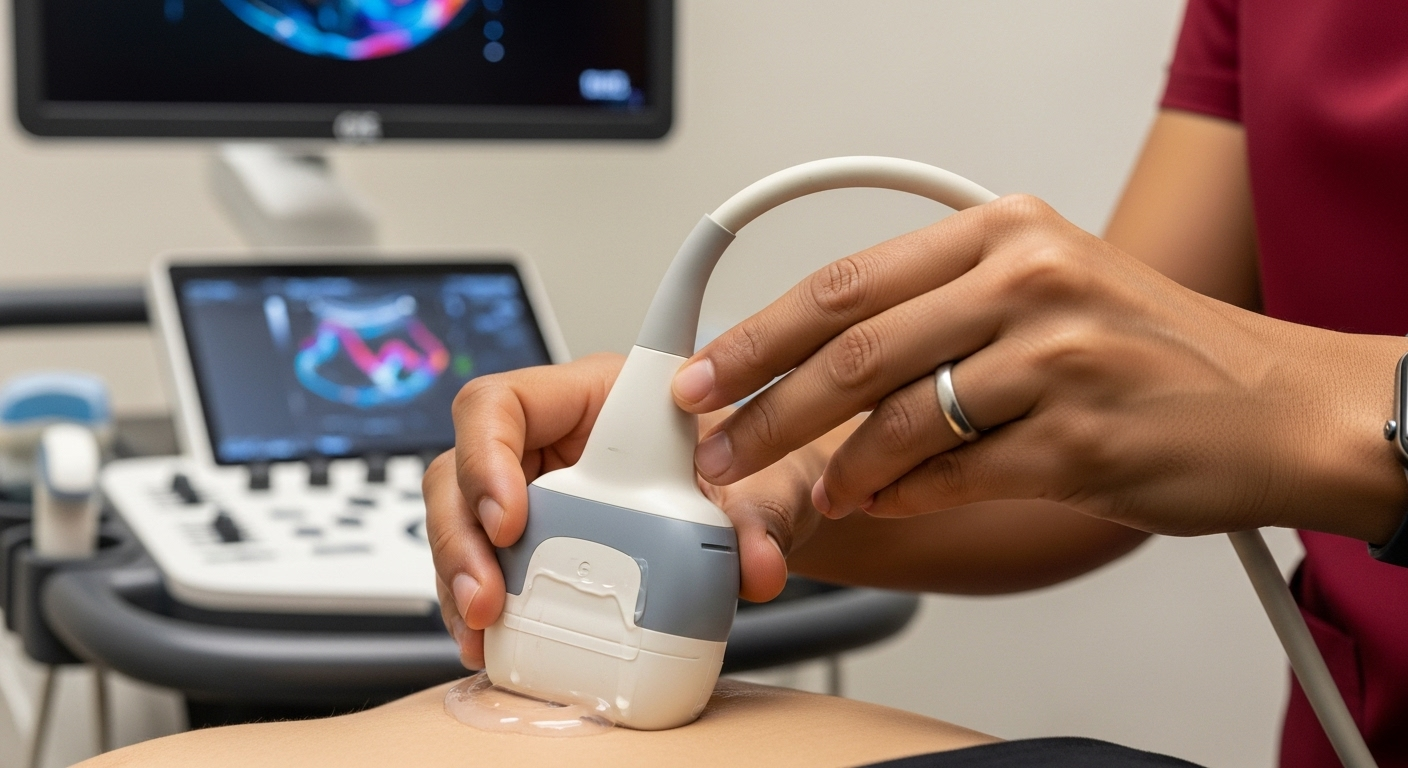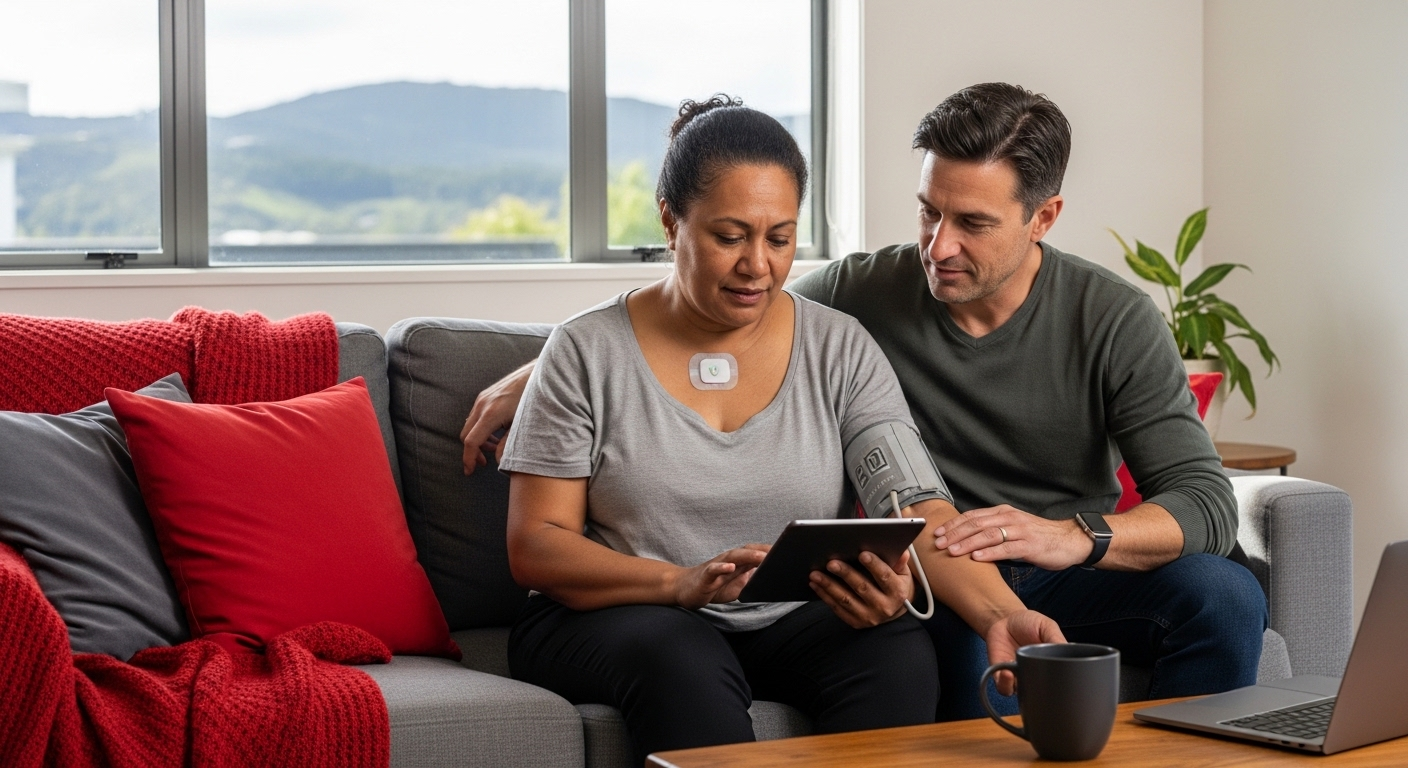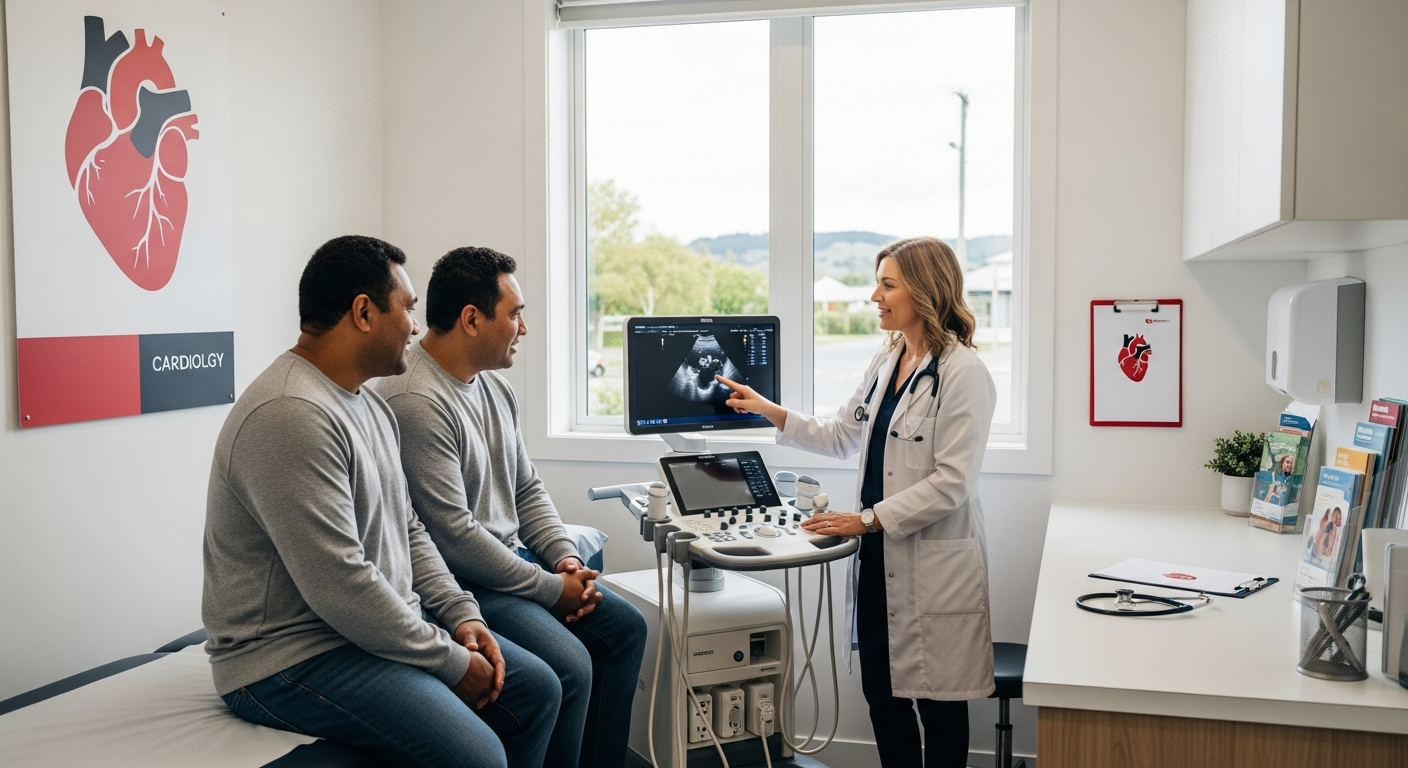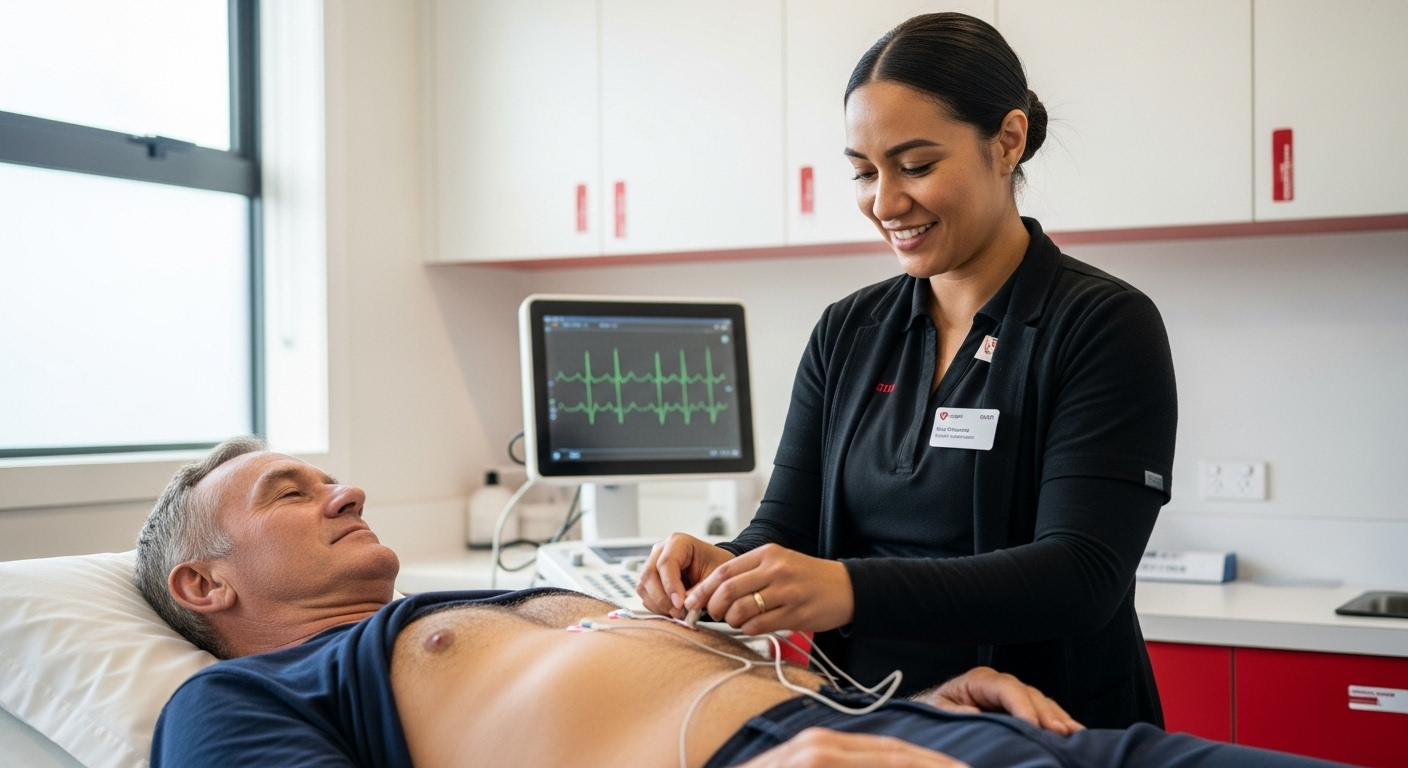The Echocardiogram: A Clearer Picture of Your Heart's Health
Echocardiogram: A Guide to Cardiac Ultrasound for Heart & Valve Health
Key Takeaways
- An echocardiogram is a non-invasive ultrasound that provides moving pictures of your heart to assess its structure and function.
- This cardiac test is crucial for diagnosing conditions like heart valve disease, heart failure, and damage from previous heart attacks.
- Public wait times for an echo in Wellington can be up to 10 months, but private options offer immediate access for faster diagnosis.
- The standard test, a transthoracic echocardiogram, typically takes about 40 minutes and requires very little preparation.
- At CardioLabs, results are reviewed by a cardiologist and sent to your GP within 24 hours for most studies, ensuring prompt care.
If you've been experiencing symptoms like chest pain, shortness of breath, or palpitations, your doctor might recommend an echocardiogram. It’s a strange-sounding word, but it’s one of the most powerful, safe, and informative tools we have in modern cardiology. Think of it as an ultrasound for your heart—a completely non-invasive way to get a detailed look at how it’s working.
But getting one isn't always straightforward. In our experience, access can be a major hurdle. In New Zealand, significant delays in the public system mean people are waiting far too long for this essential test. A recent report highlighted that at least 15,000 patients are on a waiting list, and in Wellington, the wait can be as long as 10 months for what should be a two-week turnaround. These delays can lead to disease progression and preventable harm.
That’s why we exist. We believe everyone deserves timely access to quality cardiac diagnostics. This guide will walk you through everything you need to know about the echocardiogram, from why it’s ordered to what the results mean, so you can feel informed and in control of your heart health.
What Is an Echocardiogram?
An echocardiogram is an ultrasound test that uses high-frequency sound waves to create moving pictures of your heart. The process is much like the ultrasound scans used during pregnancy. It’s painless, uses no radiation, and gives us an incredible amount of information.
This test allows us to see the structure of the heart: the size and shape of its four chambers, the thickness of the heart muscle walls, and the major blood vessels connected to it. More importantly, we can watch it in action. We see how well your heart pumps blood with each beat and how effectively your heart valves open and close. It’s a dynamic, real-time assessment of your cardiac function.

Why Would My Doctor Order an Echocardiogram?
A doctor will order an echocardiogram to investigate symptoms, monitor existing conditions, or assess your overall heart health if you have certain risk factors. It’s the go-to test for diagnosing a wide range of heart problems.
Common reasons include:
- Investigating symptoms like chest pain, shortness of breath, dizziness, or swelling in the legs.
- Detecting the cause of a heart murmur or abnormal heart rhythm.
- Assessing damage after a heart attack.
- Diagnosing and monitoring valve disease , such as narrowed or leaking valves.
- Checking for heart problems present at birth (congenital heart defects).
- Evaluating the effectiveness of treatments for heart failure or other conditions.
The growing prevalence of cardiovascular disease globally means tests like these are more important than ever. The global echocardiography market is expanding rapidly, projected to reach USD 3.98 billion by 2033 , reflecting its vital role in diagnostics. Here in New Zealand, it's particularly critical for detecting conditions like rheumatic heart disease (RHD), which can cause serious valve damage. A study found that RHD has a prevalence of 2.2% among Polynesian young adults in South Auckland —a rate comparable to low-income countries—making early screening with an echocardiogram essential.
The Different Types of Echocardiogram
While the standard echo is most common, there are a few different types of echo tests, each suited for specific diagnostic needs.
Transthoracic Echocardiogram (TTE)
This is the standard, non-invasive type of test that most people will have. A skilled cardiac sonographer applies a clear gel to your chest and moves a small, handheld device called a transducer across the skin. The transducer sends and receives sound waves, which a computer converts into moving pictures of your heart from different angles. It’s completely painless.
Stress Echocardiogram
A stress echocardiogram is designed to check how your heart and blood vessels perform under pressure. We take pictures of your heart at rest and then again immediately after you exercise on a treadmill. This helps us see if parts of your heart muscle don't work as well when you exert yourself, which can be a sign of blocked coronary arteries. If you can't exercise, we can give you medication, like dobutamine, to make your heart work harder for the test.
Transesophageal Echocardiogram (TEE)
Sometimes, we need even clearer pictures than a standard TTE can provide. For a TEE, a thin, flexible tube with a tiny ultrasound probe at the end is guided down your throat into your oesophagus. Because the oesophagus sits directly behind the heart, this method gives us an exceptionally detailed view of the heart and valves, free from interference from the ribs or lungs.
Echocardiogram vs. ECG: What's the Difference?
It&rsquo{s a common point of confusion. An ECG and an echocardiogram are both essential heart tests, but they measure different things. An ECG checks your heart's electrical activity, recording the signals that trigger each heartbeat to identify rhythm problems. An echocardiogram, on the other hand, is a structural and functional test. It uses ultrasound to check how well your heart pumps and if there are any physical issues with its chambers, walls, or valves.
How to Prepare for Your Echocardiogram
For a standard transthoracic echocardiogram, you can eat, drink, and take your medications as you normally would. There are no special preparations or things you need to avoid. You can even drive yourself home right after the test.
If you are scheduled for a stress echocardiogram, we’ll ask you to wear comfortable clothes and walking shoes. You may also be asked not to eat or drink for a few hours before the test. Our team will give you specific instructions when you book.
At CardioLabs, we aim for complete transparency. The cost for a private echocardiogram is $655 , which includes a comprehensive report reviewed by a cardiologist with management advice. We accept various payment methods, and if you are a Southern Cross or NIB member, you can seek pre-approval before your appointment.

What Happens During the Test? A First-Hand Look
We want you to feel comfortable and relaxed. When you arrive at our community clinic, our friendly cardiac sonographer will greet you and explain the procedure. You’ll be asked to undress from the waist up and given a gown to wear.
In the scanning room, we’ll ask you to lie on your left side on an examination bed. The sonographer will place a few sticky patches—ECG electrodes—on your chest to monitor your heart rate throughout the test. Next, they’ll apply a water-based gel to your chest, which might feel a little cool, and then press the transducer firmly against your skin, moving it around to capture images from different angles. You might feel slight pressure, but it isn’t painful.
The entire procedure takes about 40 minutes. We use advanced GE ultrasound machines to get clear, detailed images, ensuring a thorough and accurate assessment. You can find more details about the echocardiogram procedure on our service page.
Understanding Your Echocardiogram Results
An echocardiogram provides a wealth of information about your heart's health. Some key abnormalities we can find include the size of your heart chambers, the thickness of the heart muscle, how well your heart pumps (known as the ejection fraction), and the condition of your heart valves—checking for any blocked or leaking valves. It can also identify fluid around the heart or damage from a heart attack.
In our experience, getting results quickly is crucial for peace of mind and timely treatment. That’s why we’ve streamlined our process. For 90% of our studies, our cardiologist-reviewed reports are sent electronically to your GP within 24 hours of your test. This report doesn't just contain data; it includes management advice to help your doctor decide on the best next steps for your care.
If your test reveals an issue like valve disease, the echocardiogram is the main test to diagnose which valve is involved and how severe it is. For those wanting to learn more about specific conditions, we provide a range of resources in our patient education section.
Your Next Steps with CardioLabs
Waiting months for a crucial heart test shouldn't be the norm. At CardioLabs, we provide an alternative: expert, patient-focused cardiac diagnostics without the waitlist. Our community-based clinics in Wellington offer a comfortable setting, our sonographers are highly experienced, and our rapid, cardiologist-reviewed results empower you and your GP to make informed decisions quickly.
If you're concerned about your heart health, don't wait. Talk to your doctor about a referral to CardioLabs or contact us directly to book an appointment. Taking control of your heart health starts with getting clear answers, and we're here to help you do just that.
_Disclaimer: This article contains general information and does not constitute medical advice. The information is not intended to replace a consultation with a qualified medical professional. Always seek the guidance of your doctor or other qualified health provider with any questions you may have regarding your health or a medical condition._







